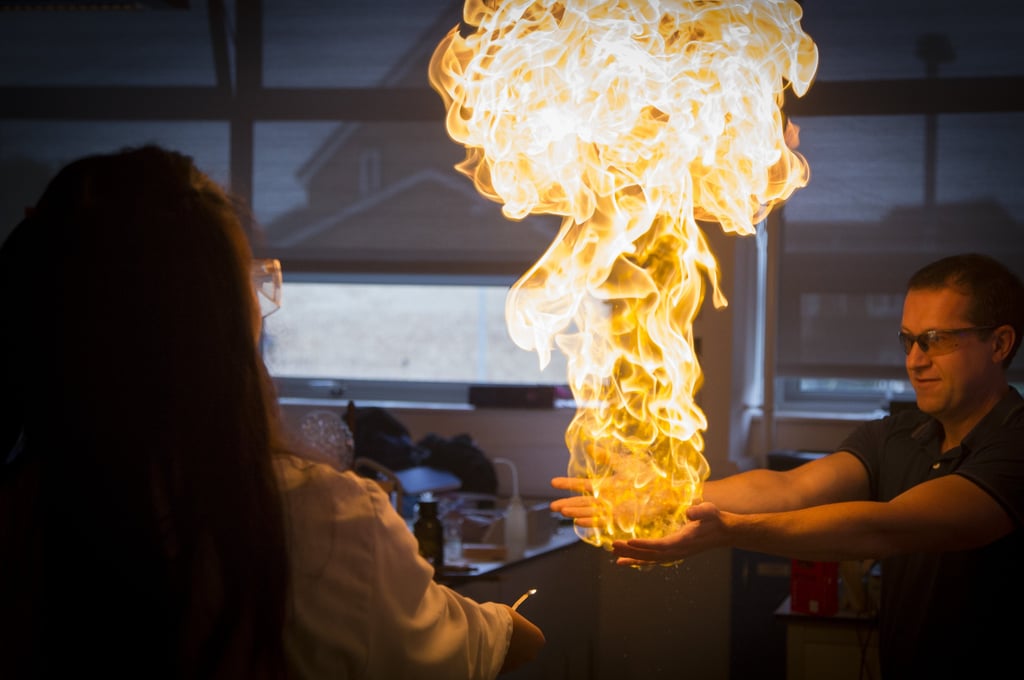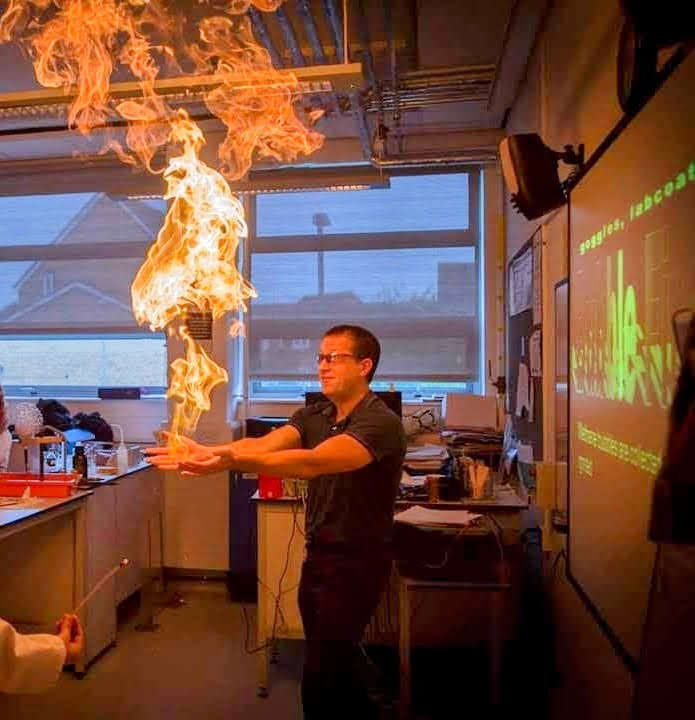
Expert A-level Chemistry Tutoring
I will help you enjoy Chemistry and get better at it than you thought possible
Please click Read More on each review
The Chemistry Tutor
Hi, I'm Dr. Torben Smith, a highly experienced Chemistry tutor and teacher with a proven track record of helping students excel. For over 20 years, I led one of the UK's top A-Level Chemistry departments as Head of Faculty and Course Leader, while also providing private tutoring for families seeking exceptional results.
In 2023, I made the move to dedicate the bulk of my time to providing top-quality one-to-one tutoring and support for tutees between sessions.
Offering a premium service means I can have fewer tutees, perhaps just 15 in total, who in turn receive a much better service. I get to know them well, understand what motivates them, and support their mental health while pushing them to excel. My students say they enjoy my lessons and learn much more than in their regular school classes.




Keen to improve your Chemistry?
Contact me via WhatsApp/SMS or leave a detailed voice message
Please check availability and prices first
(UK +44) 07749 597452
or email Torben@TutorChem.co.uk but please check my reply doesn't sit in your spam folder
2025 OCR-A: resit students 100% A*-A and all improved by 2 or 3 grades, 100% A*-A for OCR tutees and all improved, my adult learner completed the entire A-level in one year and got A grade, on about an hour of tutoring a week.
2025 AQA: resit 100% A*-A and 2 grade improvement. All AQA students improved their grade from the starting point and most but not all achieved A*-A - some had a very low starting point, 100% good pass.
Master A-Level Chemistry - with the best tutoring you can buy
Customised Topic Folders: Each contains a comprehensive collection of exam questions from various boards, specifically tailored to your syllabus, ensuring the best way to master each topic.
Personal Tutoring Sessions: Engage in an hour of one-to-one tutoring each week with Torben, sometimes a bit longer. The quality of this tutoring and the fact my students enjoy it is probably why I'm fully booked for most of the year. I currently limit my numbers to just 12 weekly tutees.
Rapid Support between Sessions: Whenever you're stuck, I’m just a text message away. Quick, effective guidance to keep you moving forward.
Study Skills Beyond Chemistry: Learn strategies and techniques that not only boost your Chemistry grades but also enhance your performance across all exam-based subjects.


"I was tutored by Torben back in 2018 when I was preparing for my A levels to enter into medical school. At the time I was not particularly good at the subject and I lacked the much-needed confidence in order to improve. Torben was able to break down each subject into easily understandable chunks and also encouraged me greatly throughout my time with him which allowed me to eventually gain the knowledge and confidence to push me into being able to pass into medical school. Now as a Junior doctor working in the NHS, looking back to my time preparing for A levels Its hard to see how I even would have had hopes of getting into medical school without Torbens help. I would recommend him above all else if you too are in a situation that I was in a few years ago" Dr Brett Lee


How much is A-level Chemistry Tutoring?
One-to-one online tutoring package from £100/week - you'll reap rewards for the rest of your life
£100/hr daytimes
£120/hr 4.00pm or later start


In person tutoring
price on application (more than online)
unavailable 2025-2026
One hour of weekly tutoring, with support between sessions, starts from £100 per week.




Keen to improve your Chemistry?
Just send me a text message, maybe on WhatsApp or call and leave me a voice message
Please check availability and prices first
07749 597452
or email Torben@TutorChem.co.uk but please check my reply doesn't sit in your spam folder


You don't need to commit long term or pre-pay
You might only need lessons until you are on track for success
Check my current availability
Essential Strategies for A-Level Chemistry Success: Study Techniques, Motivation, and Exam Preparation
1. How can I stay motivated while studying for A-level Chemistry?
Staying motivated while studying can be tough, but focus on your goals beyond the exam, like gaining entry into your firm university or pursuing a career in medicine. Break your study sessions into manageable chunks and reward yourself after each session. Try habit stacking by tying a new study habit to an existing one (e.g. after breakfast, spend 20 minutes on chemistry). Additionally, track your progress visibly—using a calendar to mark off successful study days can help keep your momentum and provide a sense of accomplishment. Make it a game, the longest unbroken streak.
2. What are the best study habits for A-level Chemistry students?
The key is consistency. Set up a daily study routine, even if it’s just 20-30 minutes per day initially. Use tools like flashcards for reactions and quizzes for key concepts. Focus on understanding the underlying principles, not just memorising facts. Breaking large topics into smaller, digestible pieces helps build momentum. Make use of the 'make it easy' rule: prepare your study materials in advance so there's no barrier to starting. It’s also useful to have at least one exam board endorsed textbook and a calculations book—these can provide a solid foundation. The website www.chemistrybooks.co.uk lists some of the best ones. Additionally, use the syllabus frequently to ensure you're covering everything in all the required topics, and once you are able the best revision by far is using past papers.
3. How can I make complex Chemistry topics easier to understand?
Break down complicated topics by focusing on the fundamentals first. For example, if reaction mechanisms are hard, start with understanding the basic types of reactions (e.g., substitution, addition). Draw diagrams or use physical models—visual learning aids help a lot in organic chemistry. When watching chemistry videos, make the process active: pause to take notes, try the example questions, and rewind if necessary to fully grasp the content.
4. How should I prepare for practical questions in A-level Chemistry exams?
Although there are no practical exams, A-level Chemistry does have questions related to practical experiments. Practice using past exam questions, even in an open book format if needed, to become comfortable with the types of practical scenarios presented. Familiarise yourself with common practicals, like titrations and recrystallisation, and make sure you really understand why each step is performed. Using the practical part of the syllabus as a checklist is also helpful to ensure that you’ve covered all required practical skills.
5. What are the most effective ways to revise A-level Chemistry content?
Active recall and spaced repetition work wonders, look these up so you understand how to do this. Create flashcards for periodic trends, key definitions, and organic reactions. Regularly practice past papers under exam conditions to build confidence and time management skills. Tackling a variety of questions will help deepen your understanding even ones from other exam boards but with advice from a teacher or tutor. Remember, doing questions is key—the questions in your textbook can help you get started, particularly the easier in-chapter ones for understanding, while the end-of-chapter ones are a better match for real exams, as well as for tests and mocks throughout the year. Ultimately, past papers are the most effective way to practice. Also, incorporate AS-level papers for extra practice, AS are challenging too and help reinforce key concepts effectively. Use the 'make it satisfying' principle—track your past paper scores and grades to see your progress over time and celebrate improvements, no matter how small.
6. Can a private tutor help with A-level Chemistry?
An experienced and engaging private tutor can be incredibly beneficial, helping you stay on track, providing consistent support, and enhancing your understanding of challenging topics. A tutor can provide personalised feedback, identify your weak areas, and offer strategies tailored to your specific weaknesses and strengths, ensuring you stay consistently engaged in your studies. Obviously i'm biased but somebody who has previously taught A-level chemistry for many years with a track record of success both in the classroom and with tutees is ideal!
7. How do I overcome procrastination when studying Chemistry?
Set small, achievable goals and start with the easiest task to build momentum. The "two-minute rule" is effective—commit to just two minutes of study, which often leads to longer sessions. Creating a clear timetable with short breaks can also reduce the mental barrier to starting. Habit stacking, where you tie studying to an existing routine, can make it easier to start. Use visual cues—keep your books and notes out in a visible place to remind yourself of your goals. Are you competitive? use that to help you beat your friends in a forthcoming test.
8. How can I retain all the reactions and reagents in Organic Chemistry?
Use a combination of flashcards and mnemonic devices to remember reagents and conditions. Organise the reactions into flow charts that show how different compounds interconvert. Regularly test yourself, and try teaching the concepts to someone else—explaining helps reinforce understanding.
9. What are the biggest mistakes to avoid in A-level Chemistry exams?
Avoid rote memorisation without understanding the underlying principles. Also, not showing enough of your working in calculations can cost easy marks. Finally, leaving blank answers is a mistake—even partial explanations or attempts might get you some marks. Practice pacing yourself so you have time to at least attempt every question. Make sure to use the syllabus as a reference to ensure you haven’t overlooked any key parts of topics or skills. For mock exams and regular tests throughout the year, these same principles apply.
10. How can I reduce stress before the A-level Chemistry exam?
Reducing stress comes down to preparation and mindset. Develop a revision schedule early to avoid last-minute cramming. Perhaps try mindfulness techniques like deep breathing before and during the exam to stay calm. Positive self-talk and visualising yourself performing well can also help reduce anxiety. Use the 'make it attractive' principle by adding small rewards for completing study sessions—this will make you look forward to studying more. Additionally, choosing the right private tutor can significantly reduce stress by providing you with structured guidance, personalised support, and accountability, ensuring you’re well-prepared and confident going into tests, mocks, and ultimately the final exam.
I don't offer lessons on alternate weeks - an hour a week is sensible
Keen to improve your Chemistry?
Just send me a text message, maybe on WhatsApp or call and leave me a voice message
Please check availability and prices first
(UK +44) 07749 597452
or email Torben@TutorChem.co.uk but please check my reply doesn't sit in your spam folder










